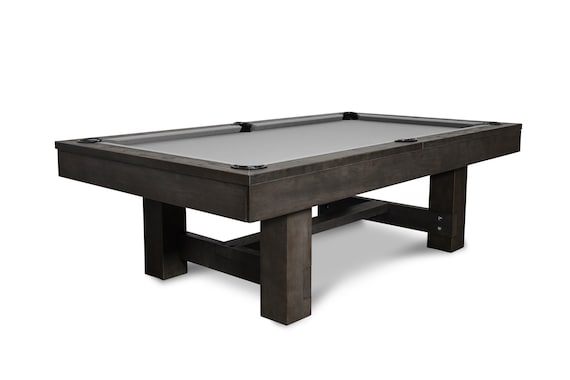Pool tables are a long-term investment for both recreational and professional players. Whether placed in a home, club, or commercial space, the quality of the table directly impacts gameplay. One common question among buyers is: Why choose a slate pool table? This guide explores the benefits, cost factors, and setup details of slate pool tables to help you make an informed purchase decision.
What is a Slate Pool Table?
A slate pool table features a playing surface made from natural slate stone. Unlike MDF or other composite boards, slate is a durable, flat material that ensures consistency in gameplay. It is typically covered with felt and supported by a sturdy frame to maintain its level surface over time.
Slate is known for its ability to remain level for many years, making it a preferred material in professional settings. Most high-end tables come with a three-piece slate bed, ensuring precise alignment and easier transportation.

Benefits of Choosing a Slate Pool Table
1. Superior Leveling and Playability
One of the strongest reasons to choose a slate pool table is its leveling capability. Slate maintains a flat surface over time, which is essential for consistent ball roll. Unlike wood or synthetic boards, slate doesn’t warp due to moisture or temperature changes. This results in more accurate and fair gameplay for all users.
2. Long-Term Durability
Slate is a hard, dense material that can last for decades when properly maintained. It does not deteriorate under normal use and resists wear better than most alternative materials. This durability justifies the initial investment, as owners typically do not need to replace the slate even after many years.
3. Professional-Grade Experience
Many tournament-standard pool tables use slate beds because of their consistent surface and precision. If you are serious about playing pool or plan to use the table for professional training, choosing a slate pool table ensures a reliable practice experience that mirrors competitive environments.
4. Resistance to Warping
Environmental changes like humidity and temperature fluctuations can cause wood-based tables to warp. This impacts the accuracy of ball movement. Slate, being a natural stone, does not expand or contract in the same way, maintaining its flatness throughout its lifespan.
5. Enhanced Stability
Slate pool tables are typically heavier, which means they remain stable during use. The weight of the slate bed anchors the table in place, reducing the likelihood of shifting or wobbling during intense gameplay. This stability adds to the overall playing experience.
Cost of Slate Pool Tables
Initial Investment
Slate pool tables generally come with a higher price tag compared to non-slate options. Entry-level slate tables can start around $1,500 to $2,000, while mid-range and high-end models may cost between $3,000 and $10,000 depending on materials, design, and brand reputation.
What Influences the Price?
- Slate Thickness: Most tables use ¾-inch or 1-inch slate. Thicker slate offers better performance but comes at a higher cost.
- Table Size: Standard sizes include 7-foot, 8-foot, and 9-foot tables. Larger tables require more slate and materials, increasing the price.
- Cabinet Material: Solid hardwood frames are more expensive but offer better support and aesthetics compared to composite materials.
- Brand and Craftsmanship: Premium brands with a reputation for quality and custom design features typically charge more.
Maintenance Costs
While the slate itself rarely needs replacement, you may incur periodic maintenance expenses such as:
- Felt replacement every 5–7 years.
- Professional leveling service if the table is moved.
- Frame refinishing or component repairs over time.
These costs are generally lower when the table is well maintained and kept in a climate-controlled environment.

Setup Considerations for Slate Pool Tables
Delivery and Assembly
Due to their weight and fragility, slate pool tables require professional delivery and assembly. A three-piece slate set may weigh over 600 pounds in total. It’s essential to hire experienced installers who can handle:
- Transporting heavy slate sections.
- Aligning and sealing the slate pieces accurately.
- Leveling the table using professional tools.
DIY installation is not recommended due to the complexity and risks involved.
Floor Strength
Because slate pool tables are extremely heavy, ensure your floor can support the weight. This is especially important in multi-level homes or older buildings. Consult with a contractor if you're unsure about floor strength.
Leveling and Adjustments
Even though slate maintains its flatness, proper initial leveling is essential. Installers use shims or adjustable legs to fine-tune the balance of the table. Once installed, a slate table rarely needs re-leveling unless moved.
Is a Slate Pool Table Right for You?
Choosing a slate pool table is a decision based on your intended use, budget, and available space. Consider a slate model if you:
- Want a table that offers professional-quality gameplay.
- Are looking for a durable, long-lasting solution.
- Have a permanent space to accommodate the table.
- Don’t mind paying more for long-term value.
If you're seeking a temporary or budget-friendly option for casual play, a non-slate table may be more appropriate. However, it’s important to understand that you may sacrifice gameplay quality and durability.
Final Thoughts
A slate pool table provides superior performance, long-term durability, and a professional playing experience. Although the initial investment and setup process can be more involved than non-slate alternatives, the lasting benefits often outweigh the cost. For those serious about the game and looking to invest in a quality product, a slate pool table is a reliable and rewarding choice.
By understanding the benefits, cost factors, and setup requirements, you can make a well-informed decision. Knowing why choose a slate pool table will help you identify whether it's the right fit for your space and playing needs.





